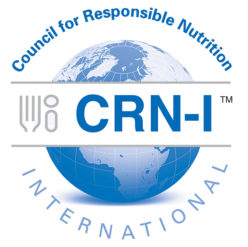1 SEPTEMBER, 2020
CRN-International Publishes Conference Reports, Adding to the Scientific Literature on the Role of Nutrition in Healthy Ageing and Translating Science into Policy for Health Promotion
ABSTRACT TRANSLATIONS:
Arabic | Chinese | English | French | German | Japanese | Korean | Portuguese | Russian | Spanish
Washington , D.C., Sept. 1, 2020—The Council for Responsible Nutrition-International (CRN-I), the international arm of the U.S.-based Council for Responsible Nutrition (CRN), has published two conference reports: “From Lifespan to Healthspan: The Role of Nutrition in Healthy Ageing” in the Journal of Nutritional Science and “Measuring Health Promotion: Translating Science into Policy” in the European Journal of Nutrition. These reports comprise expert perspectives from the CRN-I session held at the Federation of European Nutrition Societies (FENS) 2019 meeting and CRN-I’s own 2019 symposium, held in conjunction with the Codex Committee on Nutrition and Foods for Special Dietary Uses (CCNFSDU) meeting.
The FENS report, “From Lifespan to Healthspan: The Role of Nutrition in Healthy Ageing,” focuses on the impact of nutrition within the World Health Organization Global Strategy and Action Plan on Ageing and Health framework, taking a person-centered approach to healthy ageing, emphasizing the need to better understand an individual’s intrinsic capacity (i.e., their physiological and psychological capabilities and behaviors) and their functional abilities (i.e., the health-related attributes that enable them to be and to do what they have reason to value) at various life stages. “Globally, we’ve seen a marked increase in longevity, but major inequalities persist and are exacerbated by inadequate access to proper nutrition and healthcare services, and to reliable information to make nutrition and healthcare-related decisions,” said James C. Griffiths, Ph.D., co-author and senior vice president, international and scientific affairs, CRN.

Moreover, many people from both economically developing and developed societies are doubly plagued by energy excess and under-nutrition—too many empty calories. This has resulted in mental and physical deterioration, increased non-communicable disease rates, lost productivity, increased medical costs and reduced quality of life. While adequate nutrition is fundamental to good health at all stages of the life-course, the impact of diet on prolonging good quality of life during ageing remains unclear.
“Growing evidence demonstrates that access to better nutrition, improved immunity and response to disease, functioning senses—sight, taste, smell—and mobility, as well as the ability to recover physically and mentally, or even maintain wellness, when faced with stressors, may enhance how individuals age,” said Dr. Griffiths. “This evidence highlights the need for innovative research on dietary interventions to improve healthy ageing, with validated, widely accepted and quantitative biomarkers responsive to lifestyle-based interventions.”
The CRN-I symposium report, “Measuring Health Promotion: Translating Science into Policy,” complements the FENS report, taking a deeper dive into health promotion and health literacy, appropriate nutritional study design and the role the human microbiome plays in promoting health and alleviating disease. “The nutrition science community must set credible recommendations and communicate those in a way that the public will adopt,” said Daniel Marsman, D.V.M., Ph.D., immediate past chair, CRN-I, and director of Global Product Safety, P&G Health Care. “The WHO Global Strategy and Action Plan is a framework for strong progress advancing the benefits of nutrition on healthy ageing. Nutrition messaging must be based on appropriate scientific evidence and communicated in a way that encourages people to adopt healthier dietary habits, balancing calorie intake with nutrient density, and lifestyles with increased physical activity, moderate alcohol consumption, smoking cessation, and stress reduction, to benefit the individual and society.”
Reports from past CRN-I symposia are published in the European Journal of Nutrition (2011–2019) and in Regulatory Toxicology and Pharmacology (2010), with translations in Arabic, Chinese, English, French, German, Japanese, Korean, Portuguese, Russian, and Spanish, available on the CRN-I website.
In response to the COVID-19 pandemic, CRN-I will be holding a series of webinars in lieu of its annual in-person symposium normally held in conjunction with CCNFSDU meeting. Details will be coming to the CRN-I website.
20 August, 2020
Federation of European Nutrition Societies (FENS) 2019 meeting report
ABSTRACT TRANSLATIONS:
Arabic | Chinese | English | French | German | Japanese | Korean | Portuguese | Russian | Spanish
A conference report published by CRN-International (CRN-I) in the Journal of Nutrition Sciences this week, “From Lifespan to Healthspan: The Role of Nutrition in Healthy Ageing,” comprises expert perspectives from the CRN-I session held at the Federation of European Nutrition Societies (FENS) 2019 meeting, and focuses on the impact of nutrition within the World Health Organization (WHO) Global Strategy and Action Plan on Ageing and Health framework.
The FENS report is complemented by the 2019 CRN-I Symposium report, published in the European Journal of Nutrition. Together, these reports add to the scientific literature on the role of nutrition in healthy ageing and translating science into policy for health promotion. CRN-I has a library of published meeting reports from its symposia held since 2010, including translations of abstracts in 10 languages. Learn more on the here.
CRN is highlighting these publications in its Daily Supplement newsletter for CRN members and will be issuing a press release next week on the publications.
Contact Jim Griffiths for more information.
